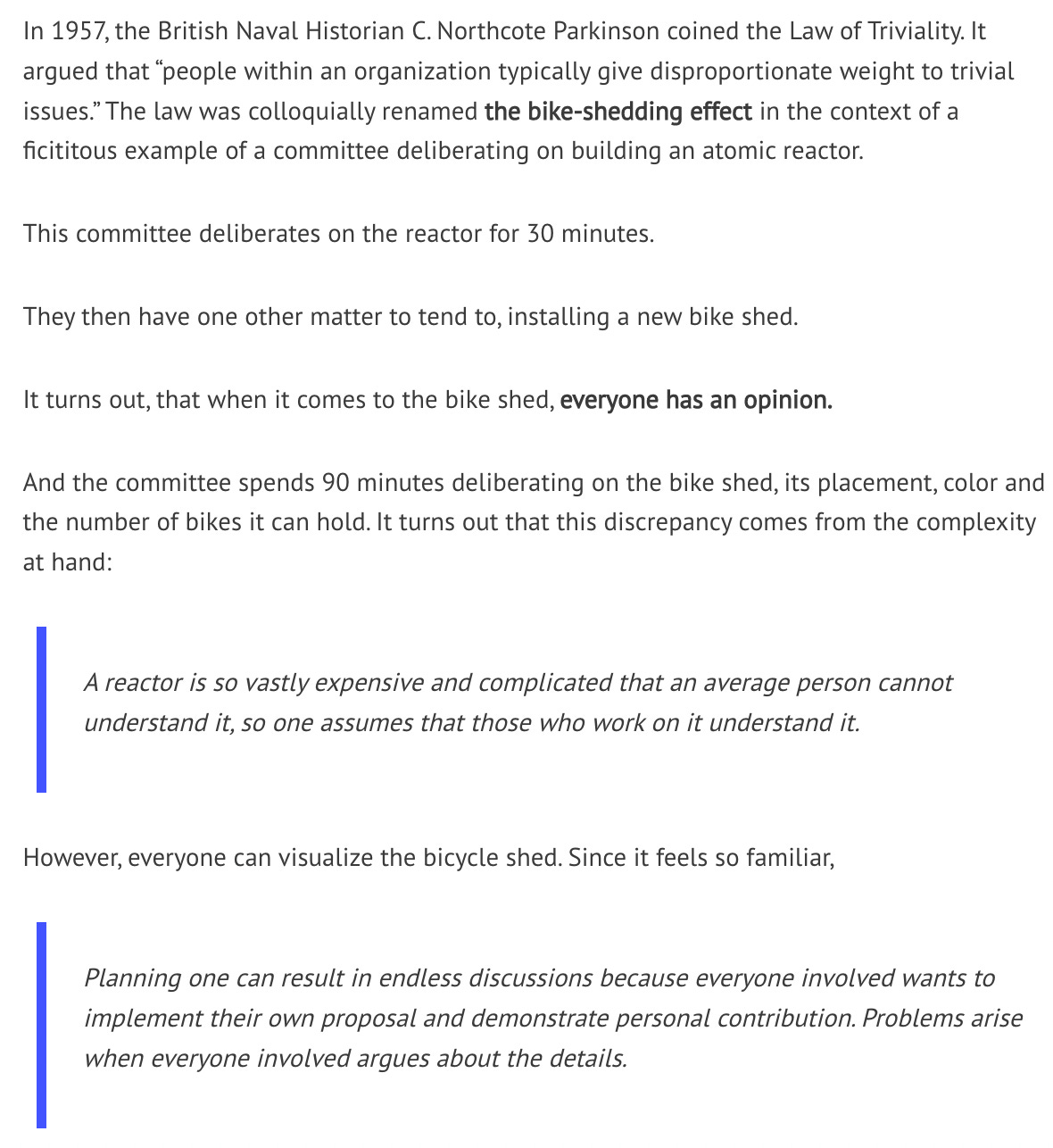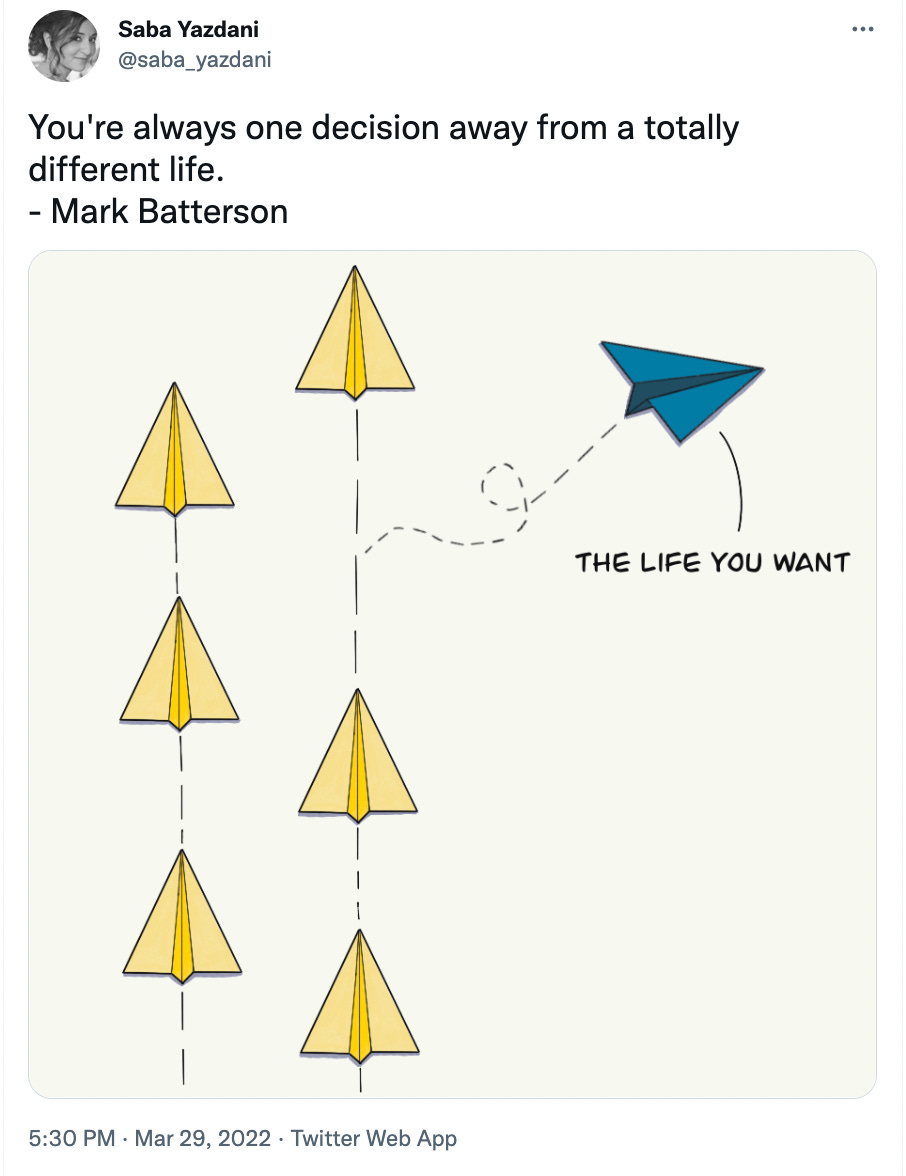#51 Somewhere between the janitor and the CEO, reasons stop mattering
Bike-shedding, non-sexy projects, high output management & more
In Algorithms to Live By, Brian Christian recommends to start a design with a Sharpie, not a ball-point. Here’s the snippet from the book covering this idea.
When we start designing something, we sketch out ideas with a big, thick Sharpie marker, instead of a ball-point pen. Why? Pen points are too fine. They’re too high-resolution. They encourage you to worry about things that you shouldn’t worry about yet, like perfecting the shading or whether to use a dotted or dashed line. You end up focusing on things that should still be out of focus. A Sharpie makes it impossible to drill down that deep. You can only draw shapes, lines, and boxes. That’s good. The big picture is all you should be worrying about in the beginning.
Focus on the intent and commitment, and get started. The journey will be a reward. And with that thought, let’s jump to today’s finds.
1. “Non-Sexy” Product Investments
All projects are not the same. There are some that show direct and immediate results. Everybody loves them. They are top of the mind and are the cause of most of the celebrations in the team.
And then there are those that don’t provide any immediate gratification, and yet need to be done. Doing them is a monumental task and requires passionate champions all along.
Casey Winters has aptly named them “Non-Sexy” projects. In his short essay, he shares a bunch of stories from his Eventbrite and Pinterest stints on how to justify such projects and align (if not excite) all stakeholders to support such projects.
My 3 key takeaways on this topic:
Create signals that can show potential impact and alert if you’re in the right direction.
Run small experiments, show results.
Evangelize, every small win counts.
2. Bike-shedding
Khe Hy shared the law of triviality aka bike-shedding effect in a recent post. Here’s the backstory from his post explaining the law and the unique name it acquired.
We all face it, we all participate in it. It’s too difficult to stay immune to this. Khe shares a couple of reasons. I find the below two inputs worth pondering about.
1) We gravitate towards tasks with dopamine…Conversely, complex and high-value tasks are hard to define and have uncertain pay-offs. Our lizard brains can’t stomach the delayed gratification.
2) We lack an objective framework to assess the significance of tasks.
3. High Output Management
Leverage, task relevant maturity, management by objective and key results (OKRs) - if you have used or heard about these terms in your work, somewhere you’re influenced by what Andy Grove shared in his seminal work High Output Management.
Abi Tyas Tunggal has done a super elaborate summary of the book. It’s a good starting point to get a quick read. I highly recommend reading the book (re-read every couple of years, if you can). He shared Tobi Lutke’s views on this book, they are just spot on!
Andy’s book is unapologetically almost a how-to manual, that kind of deconstructs the world of business into first principles. It’s like, “Here’s what matters. Here’s how to think about it. No one needs a degree.”
Finally, as Abi recommended and I concur, here’s one key takeaway from the book. Applies to every team - no matter the industry, function or maturity of the team.
A manager’s output = the output of their organization + the output of the neighboring organizations under their influence
4. Right to the city
Have you seen Old Enough! On Netflix?
If not, take out 10 minutes and watch one episode. You will be amazed. It shows a world that is unbelievable for the parent in me. Here's a quick snapshot about the show.
The premise of Old Enough!, a Japanese reality show newly streaming on Netflix, is childishly simple. In each 10-minute episode, a tiny kid sets off to complete the child’s first errand alone. (Well, “alone,” with the cameramen.) The children totter off into the neighborhood, forget what they’re supposed to be doing, burst into tears, and ultimately make their way back to Mom and Dad laden with plastic shopping bags, having succeeded in their mission. Hajimete no otsukai, which is based on a children’s book of the same name from 1977, has run on Japanese TV for more than 30 years—long enough that some kids on the show’s newer episodes have parents who were on the show!
Above excerpt is from a post from Slate titled “How Japan Built Cities Where You Could Send Your Toddler on an Errand”. Some interesting observations around urban development and cultural norms in Japanese society.
Maybe our government and society can do their job to make it possible in our part of the world as well. Yet, I wonder how I will prepare myself to let my kid venture out like this!
5. The 'No Excuses' Rule of Leadership
Sketchplanations did this nice little post titled reasons stop mattering. If you’re a Steve Jobs fanatic, you probably know this story. If not, this post covers it beautifully.
Source: Sketchplanations
6. The Bouba-Kiki effect
See the image below and suggest which of the figures is named Bouba? And which one is Kiki?
Source: sciencefriday.com
Go ahead and watch this video once you've answered the question above.
Interesting right? This harmless looking exercise is a part of efforts to explore the connection between actual meaning & the sound of a word. This problem has baffled linguists for more than 100 years now. You can read more about it here.
Thanks Sanjay for sharing this.
7. The rest of it
Some random goodness from the internet:
Interesting reads: The real story of Pixar (it was well before Steve Jobs came into picture), The making of Pandit Bhimsen Joshi (they say “if God ever decided to sing, he’d choose Pt Bhimsen Joshi’s voice”),
Places to visit: The Japanese museum of ‘rocks that look like faces’. It’s called the Chinsekikan (which means Hall of Curious Rocks) and it houses over 1700 rocks that resemble human faces.
Fun fact: Kosher food is certified during production by Rabbis to ensure it adheres to Jewish requirements. It has got a $24 Bn global market. However, Jewish account for only 20% of its consumer base. Why? Because the certification is generally considered a mark of good quality. And so, it ended up attracting a lot of users beyond the Jewish community. (Source: The Hustle)
How to get a job? An awesome story of how Jason Kilar — CEO of WarnerMedia and founder of Hulu — got his first real job (at Disney). What a standout job application! Only Deepti Chopra’s Calvin & Hobbes resume can match this creativity.
Before we sign off, here’s a gentle reminder to all of you.
That's all for this week, folks!
If you enjoyed this post, show your love by commenting and liking it. I write this newsletter to share what I learnt from others. If you learnt something from this today, why not share it with a couple of your friends to continue this chain?







